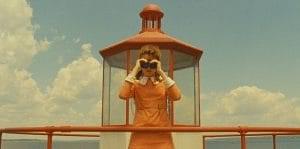
Part 1 of 3 – Do I Get to Love? Black Male Representation In Romance Films
The static-painted screen of a decade-old television filled my blackened room with light. It was always freezing in the middle of the night, and during these times, I felt more alone than ever. But, it was my sanctuary, and that old television held answers to questions I never had the thought of asking.
Each night of my high school career was chronicled by a differing romance film. But, more often than not, I cycled through the same film due to those breathless moments; the moments when you’re skin tingles, and you feel like you’re floating, are bountiful.
That film was Wes Anderson’s Moonrise Kingdom. The fictional island of New Penzance laid setting for the sprawling childhood tale of runaway love. Sam (Jared Gilman) and Susie (Kara Hayward) left a trail of love and chaos in the wake of their escape together. But, the most entertaining and influential part of this film was not the sight of their unbridled youth, but rather, their moments together not interrupted by their pursuers.

“…the most entertaining and influential part was not the sight of their unbridled youth, but their moments together, not interrupted by their pursuers.“
My eyes would expand then squint as I wiped away tears of yearning brought by their whimsical dialogue. Each line seemed improvised, and yet, also like they were carefully curated to touch on the child within every viewer.
Anderson’s careful analysis of the innocence and purity of young love was held starkly in contrast to how love can too, turn sour and not remain solely as a never-ending train of joy.
Each viewing would come to climax with the nearly ambiguous ending. Susie’s look of longing out of her bedroom window down upon Sam before he sneaks back into Captain Sharp’s (Bruce Willis) police car, left me in a stasis of pondering on my fleeting youth. When will I get the chance to feel the way they do? Their stunted moments of immaturity and eyes filled with untainted, pulsing emotion seemed like what I was meant to feel. So why couldn’t I?
With these ideals laced tightly in my mind, the monotony of life became nearly unbearable. Which day was going to be the moment I held back a rack of costumes to see the eyes of the one I love?
School became a feeding ground for these unrelenting emotions, and I fell quickly for the first girl to smile back at me. Walking her to class, exchanging and writing notes with her between the ringing of the bell, and hugging her goodbye in the bus loop, these moments were the opening scenes of my romance film. Every thought of her was grand and conjured daydreams of Moonrise Kingdom, where we were Sam and Susie.

“…these moments were the opening scenes of my romance film.“
But, she didn’t see it that way. The smiles were complementary, the notes platonic, and the hugs out of pity. What could I have done wrong? My film was incomplete and my female lead left the screen, never to be seen again. But, this mindset of wishing for a girl to play opposite in my story was created out of selfishness. It is not fair to ask for someone’s story to be only a part of yours.
But, I was young, and these truths were not reasonable to me. I only wanted to love. Another rewatch of the film brought with it, newfound answers. Love, just like the elders of the film, is not easily understood. It wasn’t fair, and it didn’t always happen the way you envision it. Love can be unrequited, and it’ll feel just as intense as true love. It’ll hurt.
And, the more I learn about love through this method, the less I truly understand. It’s a weaving, interlaced emotion, so powerful, that it can truly control your whole being. It is not to be understood, but rather, to be allowed in.
And now, that dark room is colder than before, and those moments I longed for when I was younger, seem almost out of reach. I still arrive back at the ending scene, waiting for the children’s choir to begin to sing.
Do I get to love?
Jordaine Givens is a new features writer and in part 2 of Do I Get Love, he explores the problem of toxic masculinity in Black romance films.
